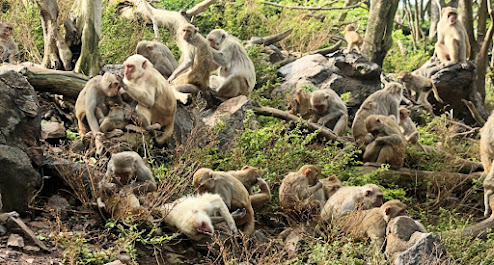 |
| A social network of macaques grooming each other on Cayo Santiago. Photo Credit: Lauren Brent |
Social cohesion and connection decline in an ageing population, according to a new study of one of humanity’s closest relatives.
For decades, researchers have been observing the rhesus macaques on Cayo Santiago (known as “Monkey Island”) in Puerto Rico.
Recent research showed that female macaques “actively reduce” the size of their social networks and prioritize existing connections as they age – something also seen in humans.
The new study, by an international team led by the University of Exeter, examines how this affects the overall cohesion and connection of the groups older monkeys live in.
While the observed macaque populations (which had no more than 20% “old” individuals) were not affected at group level, computer simulations showed higher proportions of old macaques would reduce cohesion and connection.
“For both humans and macaques, focusing on close friends and family in later life may bring a variety of benefits,” said Dr Erin Siracusa, from Exeter’s Centre for Research in Animal Behavior.
“Our study aimed to find out what knock-on effect these individual age-related changes have for how well connected a society is overall.
“We had information on six monkey groups collected over eight years, representing in total 19 social networks.
“The first thing we found is that that older female macaques are poor influencers – by having fewer friends, older females are less able to transmit knowledge and experience outside their immediate social circles.”
The researchers tested whether monkey networks with a greater number of old females (over 18 years old) were less cohesive and connected.
In the macaque populations observed, they didn’t find a difference between networks that were older compared to those with a greater number of young adults.
However, no more than 20% of monkeys were old in any given group we studied. It was still possible that even older networks would be affected.
So, the scientists created a computer model that simulated the effect of higher proportions of old macaques, and found a decline in network cohesiveness and connectedness.
“We found really substantial consequences for network structure, which could affect useful things like information transmission and cooperation, and could also limit the spread of disease,” said Professor Lauren Brent, also from the University of Exeter.
“In humans, population ageing is poised to be one of the most significant social transformations of the 21st Century.
“Our findings suggest this could have far-reaching effects on the structure of our societies and the way they function.”
With the global human population of over-60s expected to double by 2050, the findings suggest social structures, cohesion and connectedness could all change significantly.
While the human population is ageing, some animal populations are becoming younger on average – also with potentially serious consequences.
For example, older male elephants are often targeted by trophy hunters for their large tusks – and a 2021 University of Exeter study found that male elephants are more aggressive to things like tourist vehicles when fewer older males are present.
The new study was carried out by a team including the University of Coimbra (Portugal), the Technical University of Denmark, Arizona State University, New York University, and the University of Pennsylvania (USA).
Funding: Long-term monitoring of the macaques on Cayo Santiago is made possible by the Caribbean Primate Research Center, and this study was funded by the National Institute of Health.
Published in journal: Philosophical Transactions of the Royal Society B
Source/Credit: University of Exeter | Alex Morrison
Reference Number: bio02212302
